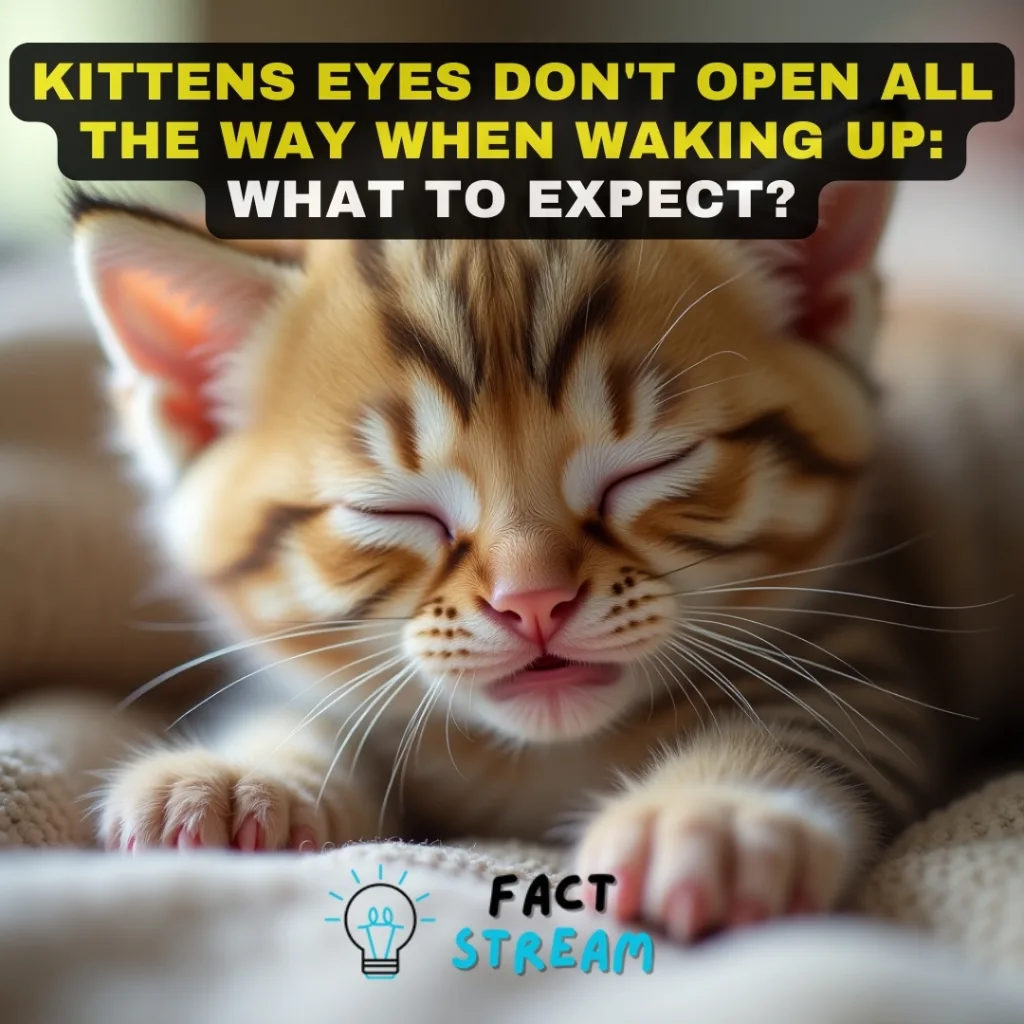Kittens Eyes Don’t Open All the Way When Waking Up: What to Expect?
Bringing home a new kitten is super exciting! You get to enjoy tiny meows and cute kitty actions. But you might see that your kitten’s eyes don’t open all the way when they wake up. This might make you wonder if something’s wrong. Usually, it’s totally normal! This article will tell you everything you need to know about how a kitten’s eyes develop and what problems you should look out for.
How Kitten Eyes Develop
Kittens are born with their eyes shut tight. This keeps their delicate eyes safe as they grow. Most kittens start to open their eyes when they are 7 to 10 days old. By the time they reach 2 weeks old, their eyes should be wide open.
Some kittens take a bit longer to open their eyes completely, and that’s okay. Every kitten grows at its own speed. Never try to force a kitten’s eyes open! You could hurt their eyes badly.
When kittens are born, they all have blue eyes. Their real eye color will start to show up around 6 to 8 weeks old.
Why Don’t Kitten Eyes Always Open Wide?
Even when your kitten’s eyes are open, you might see that they don’t always open them all the way, especially when they just woke up. Here are a few reasons why:
- Sensitive to Light: Newborn kittens are very sensitive to light. Their eyes need time to adjust to the light after being closed for so long. They might keep their eyes partly closed or squint to protect them.
- Sleepy Kittens: Just like you, kittens can be sleepy when they wake up! It might take them a little while to open their eyes fully and be ready to play.
- Special Eyelid: Cats have a third eyelid called a nictitating membrane. It’s in the corner of their eye, near their nose. This eyelid helps keep their eyes safe and wet. You might see this third eyelid covering part of their eye, especially when they’re relaxed or sleepy. This is completely normal!
When to Be Concerned: Kitten Eye Problems
While partially closed eyes are usually fine, there are some eye problems that need a vet to check out. Here are some things to look out for:
- Eyes Still Closed After 2 Weeks: If your kitten’s eyes are still completely closed after 2 weeks, take them to the vet right away.
- Puffy Eyes, Crust, or Goo: If you see a swollen eyelid, pus under a closed eyelid, or any goo coming from the eye, even before the eyes open, it could be an infection. Your kitten needs to see a vet quickly.
- One Eye Closed: If only one eye is open, look for any yellow pus. If there’s pus, it means there’s an infection, and they need to see a vet. If there’s no pus, try gently cleaning the closed eye with a cotton ball and warm water or weak chamomile tea. If it still won’t open, talk to your vet.
- Red Eyes, Squinting, or Rubbing Eyes: After your kitten’s eyes are open, these signs could mean they have conjunctivitis, a scratched eye (corneal injury), or other eye problems. Talk to your vet right away. Even small eye injuries can get worse fast.
- Third Eyelid Showing All The Time: While seeing the third eyelid sometimes is normal, if you see it all the time, and it looks red or swollen, it could mean your kitten has Horner’s syndrome. Horner’s syndrome is a problem with their nerves. Your vet will need to figure out what’s causing it and how to help.
Keeping Your Kitten’s Eyes Healthy
Here’s how to help keep your kitten’s eyes healthy:
- Clean Environment: Keep your kitten’s space clean to prevent eye infections.
- Dim Lights: When your kitten is very young, keep them in a room with dim lights to protect their sensitive eyes.
- No Soap in Eyes: Don’t use soap when you’re cleaning your kitten’s eyes. Use just warm water or weak chamomile tea.
- Regular Vet Visits: Take your kitten to the vet for regular checkups. This will help your vet keep an eye on their eyes and catch any problems early on.
One Last Thing
By knowing how kitten eyes develop and what eye problems to watch for, you can make sure your furry little pal has healthy eyes for years to come. If you’re ever worried about your kitten’s eyes, it’s always best to talk to your vet.


